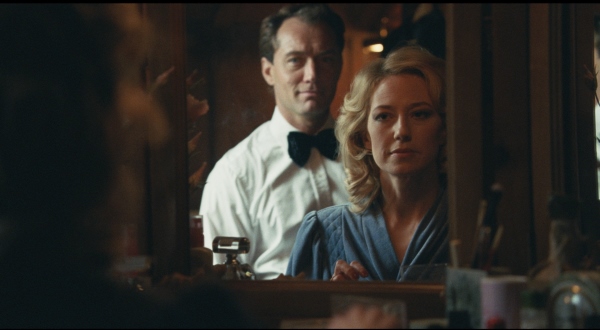

We live in an increasingly difficult time to fathom. It is therefore tempting to view any foray that a current film makes into the past as an act of denial, running away from the difficulties of the present into the assumed simplicity of yesteryear. Sean Durkin’s The Nest would look like such a movie at first glance, not least of all because it involves opulent wealth, beautiful people, and gorgeous views of the English countryside. His film, however, does not shirk any responsibility to grapple with the complexity of life, nor does it attempt to make the past as attractive as its vistas. It’s a harrowing, deeply affecting story of flawed people in a troubled time, and one of the year’s strongest films thus far.
It’s the mid-1980s. Reagan is deregulating big business and Thatcher is the UK prime minister. Rory (Jude Law), an English transplant, lives comfortably in an American suburb with his wife, Allison (Carrie Coon); her teenage daughter from a previous relationship, Samantha, who goes by Sam (Oona Roche); and their young son, Benjamin (Charlie Shotwell). Rory is a businessman with some time to spare. He adeptly plays the role of a happy, contented husband: He wakes Allison up in the morning, and he plays with the kids, yet, in seemingly offhand moments, we notice his restlessness. Meanwhile, Allison gives horseback riding lessons and noticeably smokes lots of cigarettes.
When he gets an opportunity to return to England to the life he left behind, a world of high-risk, glamour, and multiple homes, Allison makes it clear she’s not taken with the idea, but there is no stopping him. Soon, they are all living in an historic home in Surrey. Rory has bought Allison a horse, and they are building a stable for her future riding school. Sam is enrolled in a public school, Benjamin in a fancy private one.
At his old-school British commodities trading firm, Rory is determined to introduce the unfettered delights of American capitalism, singling out increased privatization. He also expects Allison to accompany him to classy parties with sophisticated people, and he spends large amounts of money under the assumption that his new job will account for his excess.
The family’s new house, in which they try and fail to make themselves at home, is itself a character. It is too large for them, and is photographed at cunning diagonals in which we are made aware of how much space remains for them to fill. Poignant, striking visual motifs abound. Characters are overpowered by archways and the openness of the Surrey countryside and then confined by the narrowness of staircases and hallways.
All the family members struggle against this doomed endeavor in their own way, and it is in the film’s exquisite acting and complex grasp of character that the drama hits home. Each role is sharply defined, and even if we can see where the story is headed, the four are still capable of surprising us.
One has the sense Law has not consistently been able find roles that best serve his talents, though he has delivered brilliant performances (The Talented Mr. Ripley, Gattaca). In The Nest, he is at his electric best as a rash middle-aged man who feels he has been denied the life he deserves. His ambition, fascinatingly, never entails sexual infidelity. Instead, he expects his wife to be equally enamored with his dream lifestyle.
Law is matched every step of the way by Coon, who believably captures the wide spectrum of emotion the situation gives rise to with gusto. Her understandable anger with Rory’s relentless spending, mad dreams, and unrealistic hopes for the family is coupled with a complicated struggle against the traditional role of wife. Additionally, both children are multidimensional characters, but Sam especially is brilliantly conceived by Durkin (Martha Marcy May Marlene) and played by Roche. She could easily have slid into a clichéd reiteration of a know-it-all teen who likes to talk back, yet Sam is also at times independent and capable of incredible compassion toward her parents and brother.
If the skeleton of the story makes it seem as though it has been told before, Durkin’s scrupulous writing makes it feel new. While the film is mostly the story of a family, it suggests wider political implications. It’s chilling to be transported to Reagan’s America and Thatcher’s England while the legacies of the unchecked big business Rory is so in love with and the rise of the self-satisfied elite he seeks to join wreak havoc in both countries. I doubt The Nest will comfort anyone, but it will leave its mark.






Leave A Comment